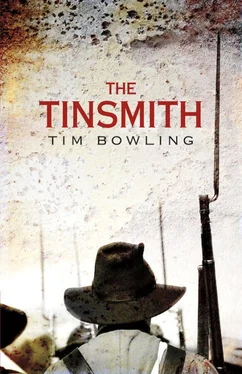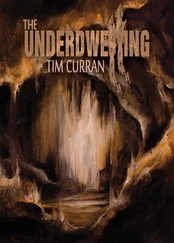They entered the mouth of Crescent Slough without seeing or hearing another skiff ahead of them. Yet Anson’s whole body tightened. It was as if they floated on a bloodstream. Earth and sky fell away, the small black wharf loomed ahead like a clot. The tide had fallen and begun its rise again since he had sped downriver with Dare. The going was now smooth, rhythmical. The Indian, however, did not relax until the skiff pulled alongside the wharf, directly behind another already moored there. With haste, Anson scrambled onto the wharf and gazed along the bank.
Dare’s cannery pounded steadily not far away, its noises erupting in sudden spurts, its smoke and lights spewing the same broken energy as the Lansdownes’ cannery. Together, they were like the inflamed lungs of some great beast that had crawled to the river to die. Anson could see dozens of shadows in the faint lamplight; they fell swiftly back and forth, flung like dead salmon. For the air was thick with their creaturely death; like a wind, it touched everything, from the silt of the low tide to the sweat on Anson’s brow. It seemed to him that the fish, in their dying, only continued their ecstatic journey in another form, one invisible to the ordinary senses. But he took no hope from the thought. He ducked his head repeatedly as he ran up the gangway, convinced the air would crack and bleed above him at any second. He had no idea where to go. Should he try to ward off Henry Lansdowne somehow or look for Dare and warn him? The night offered no guidance. For now, it mattered more that he reach the dike.
Once there, his breath came raggedly, a cramp pierced his side. He stopped and bent at the waist. The clanks and hisses seemed farther off, as if the cannery was drifting away on the very smell that it was swallowing.
Then he heard it. A single word, shouted. “Dare!” And it was like a cipher into which everything plunged: river, stars, sky, even memory. The darkness began to flow. Anson felt himself moving with it, heavy as a sodden stump, roots torn away from the earth. But when the word came again, it stopped him short. Dare . Now it was quieter. Anson wondered if he’d really heard the name a second time or merely an echo. Then he realized that the voice was not quieter, the word had fallen in unison with a sudden eruption of noise from the cannery, which now opened before him like a side of bleeding flesh. The blue-smocked Chinese, their pigtails cracking, tossed chunks of salmon from them like burning armour. The greased and bloodied conveyor belts whined. Rows of Indian women wielding knives bent so far over that they appeared headless—their elbows sliced the air as sharply as the blades they held. Steam and smoke travelled in great scuds underlit with blood. Everywhere workers trundled wooden barrows heaped with fish, as if delivering souls to the furnaces of hell. Anson stared at one worker and his burden: the living man and the dead salmon shared the same agonized expression of nothing. The planks underfoot ran slick with slime and entrails. Anson slipped as he rounded a large, pulsating boiler into which a bare-chested, wickery Chinese grinned as he tossed in chunks of cedar. The wood, like the fish, seemed recently dead. The absence of screams was as nightmarish as the sudden appearance of two Indian children, a boy and a girl no more than eight years old. Naked except for a cloth at the loins, their skin speckled with blood, they stood laughing and chewing on raw gouts of flesh. The boy had his hand inside a severed fish-head, working the jaw open and closed as if it were a puppet. Then a thick retch of steam hid them from view.
Anson stood in the midst of the chaotic order and looked desperately around. The pounding of the gears, shafts, and pistons reverberated up from the floor straight into his skull. Slowly his stinging eyes came to rest on the open wall of the building fronting the river. A tiny stitching of stars shone just below the roof beams. He started toward the light, vaguely thinking that he could regain his bearings outside and make a rational decision. But before he could escape the damp, blood-soaked interior, Anson glimpsed a dark figure slipping to the right of his vision. This time, however, the word did not come. Perhaps, he thought with horror, there was no longer any need for it. Though he had heard no shot, he knew that Henry Lansdowne was capable of a more intimate revenge. Anson began to move, the blue-smocked Chinese sliding away to either side of him as if they’d been stabbed by the grim labours of the Indian women invisible in the dirty steam. Now the word was on Anson’s lips, but he could not utter it. The letters were weighted down with blood. Anson waded through fathoms of stench with dead fish swimming around his legs, their entrails clutching like seaweed, threatening to pull him under.
The night air helped. Outside again, the name became a whisper he could hear a long way down, where he had helped to join it to flesh in the vague years already spent. He listened to himself as if the past were a compass. Then he knew where Dare would be. The knowledge came to him in a burst of clarity, the whole night’s hood thrown back off the shoulders of an indifferent, because non-existent, god. Dare would be where he had always been, where he had died even as he started to run, where Anson himself had died, where the salmon wanted to die even beyond the meaningless physical phase of their brief lives.
Anson hoped only that Henry Lansdowne would continue to search in the wrong place. If Dare could be warned, even moments ahead, he could yet prolong his dead run, as the salmon did, out of the inexorable hope of purpose inherent in generation, to pass on, if nothing else, the thrill of surviving until the blank eyes were torn by an equal hunger from the skull.
Away from the cannery, the darkness thickened as the air ran fresher. Time grew young. Despite the unceasing cramp in his side, Anson hurried along the dike and then down toward Dare’s house, which sat on the depressed earth like a doused coal. No one stirred as Anson passed. The night was suddenly fragile. Anson held the shotgun before him, pushing the seconds away like cobwebs.
The shot rang out just as the campfire winked its red at his approach. Anson covered the dark ground as fast as he could, keeping the trickle of white smoke straight before him. The gun seemed to come alive as he ran. He grasped the stock; it was slick as horse flesh.
A man stood beside the open tent, his arm lengthened by the weapon he held at his side. Feet away lay a body crumpled at odd angles: it looked like two halves of a body struggling to reconnect itself.
Anson came close, stared into the face of the standing man, who spoke with neither sadness nor disappointment.
“It isn’t him. I thought it was but it isn’t.” Henry Lansdowne was calm as only a man can be who has released his violence at last. “I should have known he’d be gone. But I thought more of him than that. I thought he’d face up to it.”
Anson bent to the now-still body, saw that it was the elderly Chinese, saw the hole in his abdomen and the long knife fallen from his hand onto the grass. And all that Anson could think was: that should have been my price, for my loyalty was older. As the last life of the Chinese drained into the ground, Anson’s scalp prickled. Slowly he looked around.
“John?”
Lansdowne tensed and brought his gun up. The campfire hissed, a fish spine of smoke stood against the dark. A throbbing of flies dripped out of the air and onto the corpse.
There was no answer except an old and ravaged echo of the voice of a trembling, runaway slave: “He did not deserve to live. He was evil.” And inside the echo, “A man can doubt everything. Even a good man.”
Anson peered into the darkness beyond where the flies were feeding. He could see no purpose there, hard as he looked. And the stars themselves were faint, sucked clean of light by the same murmurous flies near the grass.
Читать дальше












